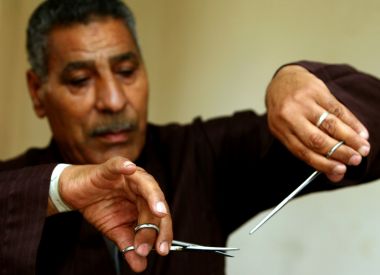Female Genital Mutilation now a problem in U.S. with influx of Muslim migrants

Female Genital Mutilation (FGM) is a practice commonly observed in Muslim countries, but since there has been an influx of Muslim migrants in the United States recently, the gruesome practice has been carried over to America.
According to CBN, 6,000 girls worldwide—from infancy to puberty—are subjected to the practice of FGM each day. It is mostly done in Africa and the Middle East. Sadly, some of the girls do not survive the mutilation because of excessive bleeding and infections. Those who do survive, on the other hand, are scarred emotionally and physically for the rest of their lives.
The process involves cutting off the external female genitalia. The defenceless innocent victims are not even given any anaesthesia to dull the pain. Mostly, the procedure is done using dull and dirty razor blades or scissors, authorities said.
In America, over half a million girls and women have already undergone FGM. Many of them live in New York City, New Jersey, and other places with immigrant populations.
One FGM survivor named Frances Cole recently marched to the Capitol in Washington D.C. with other victims to raise awareness of the abhorrent practice. "I was 11 years old at the time, and I was told that we, my sister and I—she was 13 at the time—we were told that we were going somewhere to be made into women," she recalled about her FGM experience.
Fellow survivor Mariam Bojang, who also marched to Washington, could not even find the right words to explain the ordeal she went through. "The experience of FGM is, oh my, I don't even think there is a word on earth I can describe it with. It's cruel, gruesome, no one on Earth, I wouldn't even wish it on my enemy, that's how gruesome it is," she said.
The U.S. Congress has already taken steps to protect girls and women from FGM by passing a legislation that makes it illegal for FGM to be conducted in the U.S. Twenty-four states have also enacted similar legislation.
Meanwhile, the America's Office of Equality Now, an organisation working for the protection and promotion of the human rights of women and girls around the world, is hoping to put an end to FGM in a generation. Its director Shelby Quast stressed the need for people to take immediate action against it.
"Counselors, teachers, the medical community, police, whoever really are front-line professionals that might engage with girls who are at risk—they have a responsibility to report this as a form of violence against children," she said.
Quast explained that there are actually numerous reasons why FGM is performed. "Many of those are based on patriarchy, based on controlling their sexuality," she said. Some of the reasons cited are "myths," like a woman's "body parts might grow to represent a man's if they're not cut off," she added.
Other reasons are the belief that female genitalia are dirty and ugly, and many believe it is a prerequisite for marriage.











